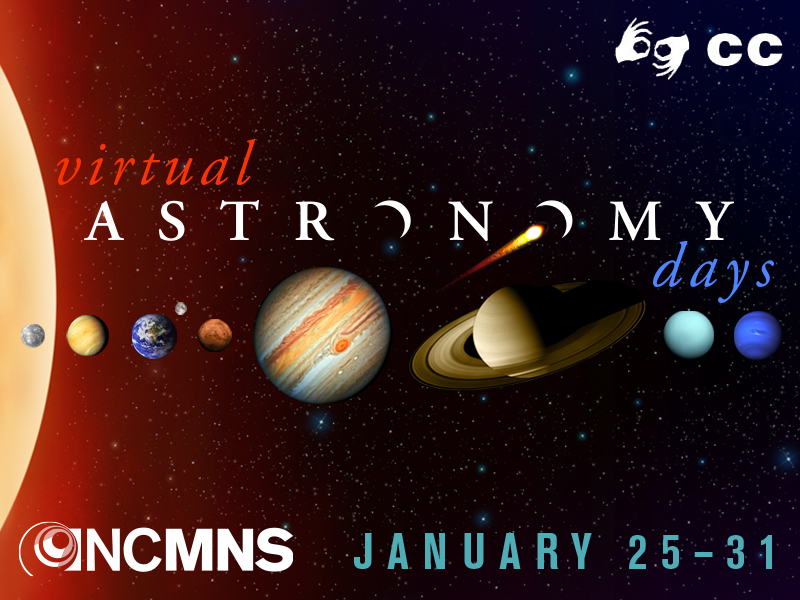NC Astronomy Days Boldly Go Virtual: January 25-31

This year, we invite you to see the big picture … of the Universe!
Join educators and scientists from the North Carolina Museum of Natural Sciences, along with members of the Raleigh Astronomy Club and NASA, to explore everything from kids crafts and activities to live chats with scientists and even a Moon Zoom.
The seven-day virtual — and free — event runs through Sunday, Jan. 31, with financial and promotional support from NC Space Grant. Visit naturalsciences.org/astrodays to view the program schedule and register for whatever interests you.
Space Grant’s funding has supported expanding the diversity of the audience, including providing American Sign Language. Space Grant also has worked with NASA Langley partners and NC educators for programming on Sunday.
The NC Space Education Ambassadors’ recorded activities are now live on the Astronomy Days page!
Highlights include:
Monday
- “Carolina Skies.” With the help of planetarium software, we’ll tour the North Carolina night sky and identify planets and stars you can see with just your unaided eyes on the next clear night. Check back for an archive recording and plan for the Star Parties as part of the NC Science Festival in April.
- “Moon Zoom.” For millennia, Earth’s nearest neighbor has inspired romance, poetry, science, exploration and innovation. Join the Raleigh Astronomy Club and NASA Solar System Ambassadors as we explore the Moon in real time.
Wednesday
- “InSight Mission Update.” InSight has been hard at work on Mars for over two years now. Join us for mission updates on the InSight lander and what we have discovered so far!
Friday
- “The Artemis Program: The First Woman and Next Man on the Moon.” Learn more about the Artemis Program’s hardware, science goals and people, including how N.C. Astronaut Christina Koch may contribute.
- “Wild Weather Across the Solar System.” Did you know there’s weather in space? On other planets, on the Sun and even on the Moon. We’ll talk about storms on Jupiter that are bigger than Earth, sulphuric acid rain on Venus, planet-sized dust storms on Mars, and more.
- “The Empire Strikes Back.” At this virtual Museum Movie Night, we will feature the second installment in the genre-defining Star Wars Saga. Catch the iconic battle on Hoth and meet the strange creature that lives in the swamps of Dagobah, known only as Yoda.
Saturday
- “SETI: The Search for Extraterrestrial Intelligence.” See how Drake’s Equation is used to estimate the number of intelligent, technologically capable civilizations that are out there in our Galaxy.
- “Night Zoom to the Stars.” We will control the 32″ telescope at Appalachian State University’s Dark Sky Observatory and remotely image celestial objects, including Mars, Uranus, the Orion Nebula, the Crab Nebula, the Andromeda Galaxy and our Moon.
Sunday
- “Science of the Webb Space Telescope.” Due to launch later this year, Webb is NASA’s next flagship space telescope – the scientific successor of the famous Hubble Space Telescope – and will reveal many previously unseen facets of our universe. The program is provided by NC Space Grant partners at NASA Langley.
- Two of NC Space Grant’s Space Education Ambassadors have developed lessons to accompany the NASA program. Check back for archive links to the elementary-grades activity from Neil Pifer, K-8 science specialist at Horizons Unlimited in the Rowan-Salisbury School System; and the middle-school activity from Betty Jo Moore, science teacher in the Forsyth County Schools. The NC Space Education Ambassadors’ recorded activities are now live on the Astronomy Days page. Follow NC Space Grant social media to share photos and videos if you use the lessons.
- “The Fermi Paradox: Why E.T. Can’t Phone Home.” Are we alone in the Universe? Is there really anybody out there? If so, why isn’t anyone returning our calls? If you’ve had these questions you’re not alone. Come explore the possibilities of life in our Galaxy!
Contact: Jon Pishney, 919.707.8083
- Categories:


